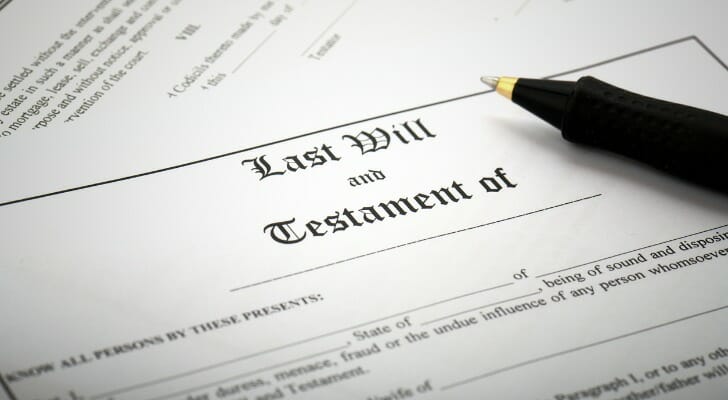A self-proving affidavit is a sworn document that attests to the validity of a will. While not required, a self-proving affidavit can speed up the probate process and render the court testimony of witnesses unnecessary. A financial advisor who offers estate planning services can prepare a self-proving affidavit and help with other end-of-life needs that you may have.
What Is a Self-Proving Affidavit?
For a will to be valid, it must be signed by two adult witnesses. When a will goes to probate, the court-supervised process of validating a deceased person’s will, those witnesses may be called to probate court to confirm the will is authentic. This testimony can delay the distribution of assets to beneficiaries and create added stress for the will’s executor if a witness has moved away or are is no longer alive.
That’s where a self-proving affidavit can be useful. This sworn statement authenticates that the testator (person whose will it is) was of sound mind when they signed their will. The affidavit is typically created simultaneously with the will, although it can be added later, provided the original witnesses are available to sign it. The testator and witnesses sign the document in front of a notary public and then attach it to the will.
While optional, self-proving affidavits can expedite the probate process and speed up the transfer of assets to beneficiaries because witnesses don’t need to vouch for the will in probate court. It also spares the executor and beneficiaries the burden of locating witnesses, which can be challenging if significant time has passed.
How to Fill Out a Self-Proving Affidavit
A person looking to attach a self-proving affidavit to their will has several primary options for doing so. First, an estate planning attorney or financial advisor with estate planning expertise can easily add one to your will. Working with a professional can ensure your will and self-proving affidavit are legal and properly written.
But if you are writing your own will, the online program you use to create the document may have an option to add a self-proving affidavit. If not, your state may include a template in its laws or on its website.
Here’s an example of what self-proving affidavit language can look like:
I / We, ____________________________, whose names are signed to the foregoing instrument, being first duly sworn, do hereby declare to the undersigned authority that the Settlor(s) signed and executed the instrument as his/her _________________ [Name of Document] and that he/she signed willingly, and that he/she executed it as his/her free and voluntary act for the purposes therein expressed, and that each of the individuals, in the presence of the Settlor(s) was at the time eighteen (18) or more years of age, of sound mind and under no constraint or undue influence.
Once you’ve acquired a self-proving affidavit form, you’ll need to arrange for two witnesses to sign the document with you in front of a notary public. Due to varying state laws, witnesses should not be beneficiaries. After the document has been signed and notarized, the last step is to safely store it with your will.
Self-Proving Affidavit Laws By State
A majority of states permit self-proving affidavits to be attached to wills. However, laws do vary by state.
In California, Illinois, and Maryland, wills are automatically “self-proved,” provided they are signed and witnessed correctly, making self-proving affidavits unnecessary. In Indiana, wills that include a self-proving clause do not need to be notarized, only signed and witnessed properly.
However, self-proving affidavits aren’t allowed everywhere. Louisiana, Ohio and Washington, D.C. do not permit self-proving affidavits to be attached to wills.
A State-By-State Look at Self-Proving Affidavits
| States That Allow Self-Proving Affidavits | States Where Self-Proving Affidavits Are Unnecessary | States That Don’t Allow Self-Proving Affidavits |
| Alabama, Alaska, Arizona, Arkansas, Colorado, Connecticut, Delaware, Florida, Georgia, Hawaii, Idaho, Iowa, Kansas, Kentucky, Maine, Massachusetts, Michigan, Minnesota, Mississippi, Missouri, Montana, Nebraska, Nevada, New Hampshire, New Jersey, New Mexico, New York, North Carolina, North Dakota, Oklahoma, Oregon, Pennsylvania, Rhode Island, South Carolina, South Dakota, Tennessee, Texas, Utah, Vermont, Virginia, Washington, West Virginia, Wisconsin, Wyoming | California, Illinois, Indiana, Maryland | Louisiana, Ohio, Washington D.C. |
What If a Will Doesn’t Have a Self-Proving Affidavit?
If a will lacks a self-proving affidavit, it can still be valid, but the probate process may require additional steps. The court will need to verify the authenticity of the will, which often involves locating the original witnesses who signed it. These witnesses must testify under oath to confirm that the will was properly executed.
This process can become problematic if the witnesses are unavailable due to relocation, death, or other circumstances, potentially delaying probate and increasing legal expenses. In such cases, courts may allow alternate forms of proof, such as sworn statements or testimony from individuals familiar with the will’s creation.
While a will without a self-proving affidavit is still enforceable, the absence of this document can create logistical and legal challenges for the estate’s executor and beneficiaries.
Bottom Line
A self-proving affidavit is a sworn statement attached to a will that can speed up the probate process after the testator’s passing. This separate document, which must be signed and witnessed in front of a notary public, verifies that the testator was of sound mind when they signed their will. While optional in most states, some states and Washington, D.C. do not allow self-proving affidavits.
Estate Planning Tips
- A financial advisor who specializes in estate planning can help you create a will, establish a trust or tackle any other estate planning needs you may have. Finding a financial advisor doesn’t have to be hard. SmartAsset’s free tool matches you with vetted financial advisors who serve your area, and you can have a free introductory call with your advisor matches to decide which one you feel is right for you. If you’re ready to find an advisor who can help you achieve your financial goals.
- If you have a sizable estate, you’ll want to familiarize yourself with the state and federal estate tax laws. As of 2025, the federal government allows you to transfer up to $13.99 million (up from $13.61 in 2024) in assets before your death without incurring taxes. However, federal and state taxes may apply to estates that are larger.
- It may be unpleasant to consider a time when you’re unable to make decisions for yourself, but a living will can give you peace of mind for such scenarios. This directive will state your wishes for medical treatment in the event that you cannot provide consent.
Photo credit: iStock.com/robynmac, iStock.com/ridvan_celik, iStock.com/roberthyrons,


